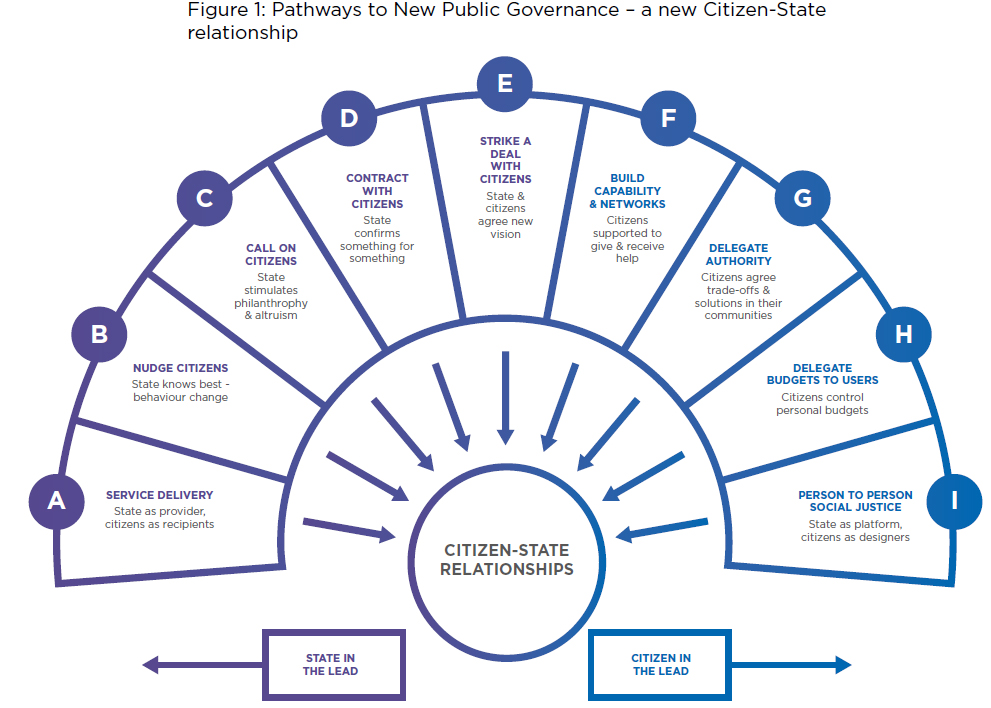Many argue that austerity, rising demand for public services and the growing complexity of social problems, such as persistent inequality and chronic ill health, presents a “perfect storm” for recasting the relationship between citizens and the state – one that is built on a more equal partnership and a recognition of the assets of citizens. Political connectivity should be key to this.
In a report published today for the Staff College, we suggest that our current social settlement needs rethinking and should be different from the one we have today. The service-centric model, which assumes that needs can be met and challenges can be resolved simply through the efficient delivery of professionally managed services, is untenable.
We know that top-down, “new public management” approaches have reduced local authorities to being corporate hubs of service delivery, and citizens to being consumers or passive recipients of state support. This is not simply an abstract critique: the fragmentation and inflexibility of public services has human consequences. For many of the most disadvantaged, it often means being tossed around a cold, confusing and disempowering web of public support. For those providing services, cultures of rigid management, accountability and risk have fuelled a disconnect between their workforce and the communities they are set up to serve.
Our research suggests that austerity has heightened these issues. Paradoxically, diminished budgets have compelled public service leaders to try to be more innovative while undermining their capacity to do so in practice. The leaders we interviewed cautioned that efficiency savings have been exhausted and a period of significant contraction and ‘retrenchment’ is now underway. For critics, if the relationship between the citizen and state has changed, it hasn’t necessarily been for the better. Reforms since 2010 have accelerated the trend towards shifting risk from the central state to local authorities and to individuals and communities themselves. ‘Responsible citizens’ are increasingly expected to compensate for state withdrawal. Some have described this as an emerging ‘do-it-yourself’ model of self-governance.
Our review has nevertheless uncovered many national and international examples of the state and citizens working together differently to achieve better outcomes, including in times of austerity. At the heart of these initiatives has been an ethos of co-production, partnership and valued citizen input. The report outlines a spectrum of approaches (see diagram below) ranging from state-led initiatives (such as ‘nudging’ citizens towards more pro-social behaviours) through to putting citizens in the driving seat of shaping services and budgets.
One case study we feature is the West London Zone (WLZ), modelled on the successful Harlem Children’s Zone. WLZ is bringing together the resources of the social sector and local communities to achieve collective impact in improving outcomes for children and young people. The initiative provides a ‘cradle to adulthood’ pipeline of tailored and co-produced support, helping children most at need at different stages of their life. A link worker ensures that service users access the support they need in a joined up and coordinated way. A central part of the social sector-led programme involves working through the community’s existing groups to build community capacity and spread support for constructive social norms: strengthening a sense of ‘community’ in often fractured places. WLZ blends the resources and services of the public, private and social sectors, and points to an emerging role for the state as a partner and collaborator, rather than sole driver, of positive change.
Despite the value of these models, one of the findings of our research is that they continue to remain at the margins rather than at the mainstream of practice. There are many reasons for this. Part of the answer lies in a lack of an evidence base coupled with concerns about cost and value for money. But more fundamentally it has something to do with the historic role, wiring and culture of public services. Local government in the UK has been very effective as a corporate manager of service delivery, but this central focus has prevented more energetic forms of local place-based leadership and citizen involvement from emerging. Participatory initiatives have tended to be either tokenistic or top-down, based on a deficit understanding of citizen capabilities and focused on service delivery rather than citizen empowerment.
In other words, there is a democratic deficit at the heart of our public policy. When this is combined with a growing sense of economic insecurity and feelings of helplessness and loss of control, society’s social contract becomes strained. Brexit has shown that a failure to give a genuine stake to marginalised communities can have serious ramifications. This is why the RSA’s work on inclusive growth and citizen-led economic decision making is so important.
The Public Services and Communities (PSC) team at the RSA proposes connectivity – social, economic and political – as a means for empowering citizens and communities to meet their needs and aspirations. Political connectivity is key for addressing the democratic deficit and providing a more positive basis for the citizen-state relationship to develop. As Charlotte Alldritt argues, “the current yearning for a new kind of politics is symptomatic of a chronic lack of connectivity at a local and national level,” seen for example in the fragmentation of government policies and the highly technocratic nature of major reforms such as devolution. New forms of citizen-based governance must be pursued to address this. Our report provides some models of practice, but there is plenty of work left to do.
Read the report Changing the narrative
Related articles
-
Beyond Beveridge - An interview with Charles Leadbeater
Paul Buddery
In the first interview for our 'Changing the Narrative' project, Charles Leadbeater discusses Beveridge, frugal innovation and shifting expectations in public services.



Join the discussion
Comments
Please login to post a comment or reply
Don't have an account? Click here to register.
Post Brexit, I've been thinking along the lines of values and rightly or wrongly have come to the conclusion that Brexit values aligned with a more communitarian outlook whereas Bremain values aligned wih a more liberal outlook. This points to the dynamic between communitarianism and liberalism with the former evoking a need for commnity continuity and stability and the latter evoking a need for community change and growth.
However, the trouble with liberalism and its need for change and growth is that it is inherently ecologically and socially destructive which is a good thing if change and growth is required but also a bad thing since it is inherently unsustainable. Liberalism, whether social and economic, is fundamentally unsustainable since if all living things had the right to life, liberty and the pursuit of happiness then we would all starve or else be immobilised by moral constraint. This points to the fact that the sustainability of life is underpinned by life/death relationships but if not properly managed, these life/death relationships will inherently lead to unmanaged competition even if under the liberal framework of individual rights-based entitlements. This is why economic liberalism inherently leads to uncontrolled competition and the formation of monopolies of power and why social liberalism or individualism hollows out communities and leads to atomisation, alienation, identity politics and consumerism.
In this respect liberalism as a social policy tool has been a good thing in terms of deconstructing traditional communities based on entrenched patterns of patriarchy, gender inequality and class inequality but this creative destruction now needs to be rolled back in order to allow communities to recoalesce on the basis of virtue-based value systems and in particular, ones I argue that are designed to create a sustainable future that is built on a platform of community democracy and community resilience.
This I think is the true nature of the communitarian backlash against the eu and the globalised liberalism that it supports. Unmanaged liberalism is inherently unsustainable and destructive and whilst it is a useful ideology to deconstruct and reform communities as a social change tool, at some point it is necessary to withdraw the use of this tool in order to allow communities to reformulate around different principles. Quite ironically, with regards the eu debate, the communitarians (brexiters) were using liberalism to support their communitarian arguments whilst liberals (bremainers) were using communitarianism to support their liberal arguments.
This highlights that liberalism functions as part of a dynamic with communitarianism with the former being used to evoke change and growth wheras the latter is used to evoke continuity and stability. As such, yes the competition of liberalism is as important as the cooperation of communitarianism but each needs to be recognised for the benefits and losses they bring in order to manage social change and social continuity. In this respect, progress for its own sake and the constant social change that liberalism through individualism and self-interest brings in the form of atomized competition is damaging and unsustainable if it is not consented to by all segments of society. In effect, by trying to bring half of a society unwillingly into the liberal mold whether through eu membership or through centralised government imposition is not only undemocratic but also disrespectful of others that might wish for continuity and stability in order to build up community values through decentralised democracy and resilience. Liberalism does not allow for this regrounding of community rights because it relies upon competition or creative destruction in order to constantly change and grow society or in international order terms, it requires a willingness to cooperate in order to compete to evoke constant change and growth on a global level.
In conclusion, without recognising that liberalism is paired with communitarianism and that the two need to be applied to varying degrees according to consensus then we are not only damaging our ecological and social relations through imposed competition, which arises because liberalism is unable to reconcile the rights to life, liberty and the pursuit of happiness when expanded to all living life-forms, but we are also damaging our relation with our self since this competitive outlook is internalised to form a divided antagonistic self. So whilst liberalism is an important socio-economic policy tool to enforce change and growth through negative rights, the inherently competitive and unsustainable effects of liberalism needs to be recognised as such and so it needs to be recognised that liberalism has as its opposite a communitarian perspective that enforces continuity and stability through positive rights and so allows communities to cooperate on a platform of democracy and resilience to formulate their own identities and values. However, if over time this continuity and stability creates entrenched inequalities, then liberalism again becomes useful to creatively destroy these entrenched inequalities. As such liberalism and its inherently competitve outcomes and communitarianism with its inherently cooperative outcomes are social policy tools which can be applied to varying degrees to create a managed dynamic between change and continuity in that if continuity (and sustainability) is required then communitarianism needs to come to the fore whereas if change (and unsustainability) is required then liberalism needs to come to the fore. At present I would argue that communitatrianism needs to come to the fore in order to ingrain communities with a sustainable development ethic based on stability which I argue would be best achieved by creating a global cooperative network of decentralised democratic communities which is underpinned by an ethos of decentralised community resilience.